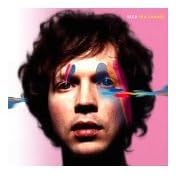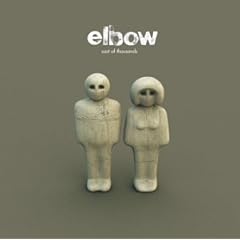Beck - Sea Change
Beck - Sea Change
by Lisa Oliver

For years I disregarded Beck. When “Loser” came out, I thought “novelty song” and dismissed it outright. Still, despite my best efforts via various accidental means (similar to my deal with Everyone Loves Raymond I utterly dismiss it, yet somehow I’ve seen it), I ended up hearing bits and pieces of Mellow Gold and it didn’t change my mind (see aforementioned Everyone Loves Raymond reference). Then Odelay came out and even with a few strong singles, I remained nonplussed by the key-fob sized Mr. Hanson. Plus, the cover of that album really got to me after awhile. I mean yeah, it’s kind of funny but it just looks like it’s totally aware of being a weird/funny album cover. And that kind of overly conscious, cultivated oddity works me into a right lather. Like doofuses who think it’s cool to collect John Wayne Gacy's paintings.
So I sat on the sidelines and outright ignored Mutations at the time (at the urging of my boyfriend, I recently gave it a shot and it’s not bad). Sounds like reanimated Syd Barret and a non-sucking Bowie, with dusting of post-krautrock Eno and Nick Drake's gossamer whisper. Midnite Vultures was fine, but never made it to heavy rotation; I only just realized “Debra” was on it.
Signal Sea Change. I heard “Guess I’m Doing Fine” and I melted. Then I heard “Golden Age” and was an utter goner; it never occurred to me that it was Beck. I got the whole album and I’m not really sure what the tipping point was–music, words, time in my life–but for some reason it all washed over me in a gorgeous, honey-hued haze. After further listening, with the initial infatuation gone, I realized that all the tracks have a similar aural range and the lyrics, well, aren’t great. They remind me of Foo Fighters lyrics in the sense that there are intense fragments of insight, but also an internal monologue that we don’t hear and ultimately, the lyrics and vocals end up acting as another instrument. I mean, yes, there is the obvious theme of Beck’s long-term relationship ending but the music speaks far louder than the words. The same slow tempo mimics the static blur of heartache and the mourning period that follows it. Most ballad-inclined musicians don’t realize how difficult it is to play slow music smoothly and have it land right in the pocket so it ebbs and flows seamlessly. Impressively, Sea Change flows as a body of work and sustains, like a book.
One of the reasons I moved away from big cities and back to my medium-sized hometown was that I had lost sight of the sky. In big cities, you are able to catch glimpses of it, but not whole sheathes. I still marvel at the expanse of sky now – despite the fact I’m two years into sky sightings. I played Sea Change in my car to re-inspire myself for this piece. As I was driving down the highway to go food shopping, I realized this album is like watching the sky – a thick patina of blue, white and gold. The swath of big sky, like the sea, shows no endpoint, no horizon line. Kind of like heart-break – it rolls on and on. With Beck’s help (of all people!), I can see the sky, the endpoint and the beauty of the stars. Can hear 'em too.
Lisa Oliver is a Columbia-educated writer whose work has appeared in The Guardian, Stylus, The Fly UK, Musicweek UK, Yahoo! Music, NME, Publishers Weekly, Domino and People.
by Lisa Oliver

For years I disregarded Beck. When “Loser” came out, I thought “novelty song” and dismissed it outright. Still, despite my best efforts via various accidental means (similar to my deal with Everyone Loves Raymond I utterly dismiss it, yet somehow I’ve seen it), I ended up hearing bits and pieces of Mellow Gold and it didn’t change my mind (see aforementioned Everyone Loves Raymond reference). Then Odelay came out and even with a few strong singles, I remained nonplussed by the key-fob sized Mr. Hanson. Plus, the cover of that album really got to me after awhile. I mean yeah, it’s kind of funny but it just looks like it’s totally aware of being a weird/funny album cover. And that kind of overly conscious, cultivated oddity works me into a right lather. Like doofuses who think it’s cool to collect John Wayne Gacy's paintings.
So I sat on the sidelines and outright ignored Mutations at the time (at the urging of my boyfriend, I recently gave it a shot and it’s not bad). Sounds like reanimated Syd Barret and a non-sucking Bowie, with dusting of post-krautrock Eno and Nick Drake's gossamer whisper. Midnite Vultures was fine, but never made it to heavy rotation; I only just realized “Debra” was on it.
Signal Sea Change. I heard “Guess I’m Doing Fine” and I melted. Then I heard “Golden Age” and was an utter goner; it never occurred to me that it was Beck. I got the whole album and I’m not really sure what the tipping point was–music, words, time in my life–but for some reason it all washed over me in a gorgeous, honey-hued haze. After further listening, with the initial infatuation gone, I realized that all the tracks have a similar aural range and the lyrics, well, aren’t great. They remind me of Foo Fighters lyrics in the sense that there are intense fragments of insight, but also an internal monologue that we don’t hear and ultimately, the lyrics and vocals end up acting as another instrument. I mean, yes, there is the obvious theme of Beck’s long-term relationship ending but the music speaks far louder than the words. The same slow tempo mimics the static blur of heartache and the mourning period that follows it. Most ballad-inclined musicians don’t realize how difficult it is to play slow music smoothly and have it land right in the pocket so it ebbs and flows seamlessly. Impressively, Sea Change flows as a body of work and sustains, like a book.
One of the reasons I moved away from big cities and back to my medium-sized hometown was that I had lost sight of the sky. In big cities, you are able to catch glimpses of it, but not whole sheathes. I still marvel at the expanse of sky now – despite the fact I’m two years into sky sightings. I played Sea Change in my car to re-inspire myself for this piece. As I was driving down the highway to go food shopping, I realized this album is like watching the sky – a thick patina of blue, white and gold. The swath of big sky, like the sea, shows no endpoint, no horizon line. Kind of like heart-break – it rolls on and on. With Beck’s help (of all people!), I can see the sky, the endpoint and the beauty of the stars. Can hear 'em too.
Lisa Oliver is a Columbia-educated writer whose work has appeared in The Guardian, Stylus, The Fly UK, Musicweek UK, Yahoo! Music, NME, Publishers Weekly, Domino and People.
Labels: Lisa Oliver



